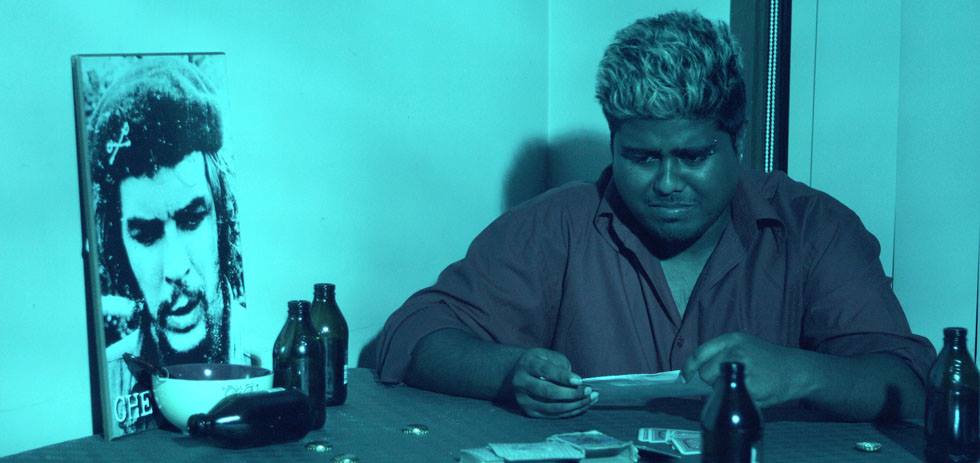
The story of Riz is based on events in the life of co-writer/director Guido Gonzalez, where a young man trusted by all of his mates suddenly skipped out and left them stranded with bills to pay in their Cabramatta home. With collaborator S. Shakthidharan and a cast and crew of local newcomers, it has positioned itself both here and at MIFF as a truly independent and homegrown effort, which is something that, in principle, both festivals should be making a special effort to include. Gonzalez himself has touted the need for authenticity in press interviews, and so his and S. Shakthidharan’s screenplay specifies a 2001 setting and mix of character ethnicities that practically dare audiences to doubt the truth of the issues they’ve explored. The reason true events are adapted to film narratives, however, is to contextualise the behaviour and try to understand it, and although Riz evidently sets out to do as much, it comes up sadly empty.
The treacherous young man under the microscope is the film’s titular character, played by Varun Fernando, and he takes a short while to appear. The first few minutes instead consist of his closest mates (Firdaws Adelpour, Henry Vo, Jamie Meyer-Williams) helping to make a video for his birthday by talking up how kind and helpful he’s been to them all through high school. They tell stories to a camera about how he’s pulled strings to get them out of legal trouble, or just been a great mate in trying times, which builds up a near-legendary impression of him. It turns out that he’s across town with his girlfriend Kylie (Sophie Hawkshaw) at that very moment, having a candles-and-wine dinner. When he presents her with earrings and considers travelling overseas with her, it’s natural to assume this is just more testament to how kind and open he is, and there doesn’t appear to be a conflict of interest between the two… until Shakthidharan edits in a stiff cutaway scene of him cutting a back-alley deal for the earrings from his car. It registers later that he and Gonzalez are symbolising his efforts to escape the confines of the working class, but there is nothing to properly impart what those confines are, how they affect him, and why he has to keep one world a secret from the other.
At this point, you could think that this is just a mere bit of inelegance in delivering a plot point or two. The aesthetic, after all, has a dank digital fuzz and ProTools-sounding score that you would expect from a low-budget project made by people with little to no prior experience in film-making. Such a production won’t ever look as proficient as other fare playing at the festival, and just as that discrepancy can be adjusted to, so can any small obscurity in the story. As that story unfolds though, with Riz leaving his friends stranded with a rent bill and his mother Helen (Anandavalli) working to fix the damage he’s caused, the lack of character traits that would help us rationalise how they got here only makes the obscurity bigger. There’s an aching lack of detail on where his desires come from, as well as the people he is attached to. By the end, we know little about his friends beyond their dogged loyalty to Riz and want of a better life, and little about Kylie, who is supposedly his idol for that better life he aspires to but who has no traits beyond being alternatingly affectionate and concerned (save for a single office break room flashback in which Hawkshaw and Fernando establish a lovely rapport together). It also doesn’t help that the screenplay employs cheap tactics to delay important developments, like Riz being about to confess his actions to his friends and then arbitrarily changing his mind or getting interrupted by someone else, which only drags out the rate at which the film fails to satisfy its own narrative threads.
The cinematographic direction by Vincent Tay exacerbates matters by choosing angles at odds with what the dialogue is searching for – one exchange between Riz and Helen indecisively swaps between entirely different vantage points, phone conversations switch out settings with jarring colour temperatures, and each instance clashes badly with the earnest, expletive-laden dialogue. When it’s not making awkward choices in cinematic language, whole discussions are filmed from a static angle that makes it feel largely like a stage play caught on film, which might be unsurprising given its origin as a transmedia presentation at Carriageworks but also deadening with regards to the central drama. Without even an engaging tone to fall back onto, the film flounders on through to a painfully blunt monologue from Fernando and a flat emotional climax that delivers too little, too late.
Gonzalez has expressed in interviews his intention to lay out a different class and cultural mix of Sydney than that glimpsed in beach-tanned stereotypes, and the concept of the production seems like a great way to carry that out. The problem is that its central conflict is so weakly communicated that the main character comes across less as a man at odds with the societal structures pigeonholing him and more like someone who lacks either common financial sense or an ability to deal emotionally with straightforward life decisions. You can tell from the jackhammer-subtle Che Guevara insertions1 alone that there’s greater aspirations, but through an absence of characters and conflicts that properly embody it, those attempts amount to literal grousing from a drunk high schooler. Riz has all of the noble intent in the world, but it doesn’t take enough care in its narrative to deliver on it.
Around the Staff
| Jeremy Elphick | |
| Brad Mariano |
